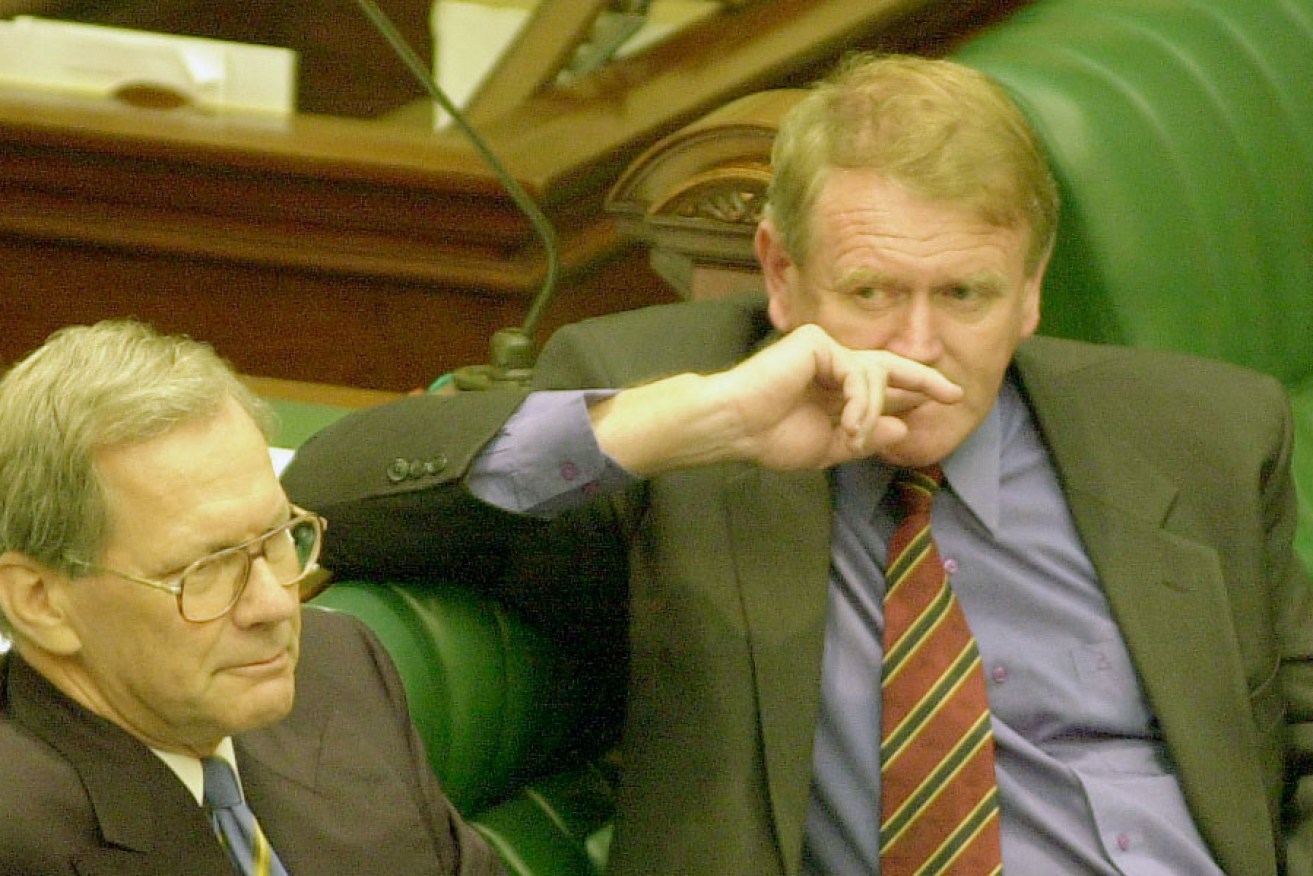Grim anniversary for Australia’s least successful party

Rob Kerin (right) and Dean Brown in Parliament on 5 March 2002 - Kerin's last day as Premier.
Negative electioneering, a small-target strategy and a failure to project a positive vision for the future have helped make the state Liberals the least successful division of any Australian major party in the past half-century, according to former Premier Dean Brown.
The Liberal elder statesman made a rare exception to his long-standing refusal to comment on party matters to talk to InDaily ahead of a milestone that many in conservative politics will be hoping to forget.
Tomorrow will mark 50 years since Tom Playford fought his last election, bringing to an end 32 years of continuous rule by his conservative Liberal and Country League.
The Liberals had been virtually unassailable, the natural party of South Australian Government.
Since then, they’ve been in power for just 14 of the ensuing 50 years – easily the least successful major party of any Australian state.
Brown, one of the five Liberal leaders who served as Premier in that time, says there are “a number of lessons there” for his party.
“The first lesson is that the party has to apply stronger internal discipline,” he said.
“Another factor has been the failure of the party at times to understand and look to the future; it’s tended to get into very negative electioneering and a small-target strategy, which I think has been a failure.
“And it’s at times failed to project, process and reflect what’s needed in the development of the state.”
Brown thinks Liberal incumbent Steven Marshall is “doing a good job”, but argues “the party itself needs to realise – and has failed to do so over many of those years – that the public will vote for the future”.
“They’re voting for their future, and by implication the future of the state … I don’t think at times the party’s done a particularly good job of projecting that,” he said.
According to Brown, the Liberals “put in a lot of effort” to do just that in 1979 and 1993, the two standout electoral high-points of its wilderness years.
But those successes were shortlived, with David Tonkin’s one-term Government a warm-up act for another Labor decade, while Brown’s own premiership was prematurely ended by party in-fighting.
“It’s a pretty lamentable performance,” reflected Adelaide University’s resident political doyen Professor Clem Macintyre.
“It’s not been a good 50 years (for them)…they’ve struggled to present that unified, coherent alternative that an Opposition should provide.”
A performance made worse by the fact that, prior to 1965, “they were clearly the dominant force”.
“SA was unambiguously a Liberal state (but) over the last 50 years there’s no argument that the natural party of government has been Labor,” Macintyre said.
And the shame, he says, is not just for the Liberals themselves.
“We all know that good Government needs good Opposition; Governments behave better when the Opposition is at its peak and keeping governments to account and on their toes,” he said.
“Anyone looking at the history of SA politics over the last 50 years, it would be hard to make an argument that the Liberal Party has provided the strong, effective Opposition that good Government needs.”
The Liberals’ pre-’65 dominance didn’t merely reflect SA’s traditional conservatism, with LCL-supporting rural districts wielding disproportionate influence over the make-up of parliament – the infamous ‘Playmander’.
“Labor was winning 55 per cent of primary vote but not winning the election,” Macintyre said.
But Playford’s policies of industrialisation and “providing sweetheart deals for manufacturing organisations … meant the population of Adelaide stretched out beyond the metro seats, particularly in the northern suburbs”.
It spilled into regional seats, reducing the effectiveness of the Playmander and allowing Frank Walsh to break the conservative stranglehold on power.
But it was Steele Hall, the next Liberal Premier, who ironically ended the hegemony by implementing sorely-needed electoral reform.
“You can argue his principles in a sense contributed to the defeat of his party, and he should be commended for that, I think — not for losing the election but for recognising there was a wrong that needed to be righted,” Macintyre said.
Hall later founded the breakaway Liberal Movement, arguing that his party had “lost its idealism”.
“That was the origin of the Chapman/Evans dispute,” said Macintyre, recalling the ongoing internal divisions that have riven the Liberals ever since.
“Marshall deserves some praise for minimising the effect of that division, but there can be no doubt the state Liberal Party has been bedevilled by that divide for much of that 50 years.”
InDaily contacted Steele Hall for comment, asking whether he had any regrets about pursuing electoral reform in 1968, in light of his party’s subsequent ill-fortune.
“It was a long while ago in those days, and very few people are interested (now),” he said.
“At the moment I’m not really saying anything about all that.”




